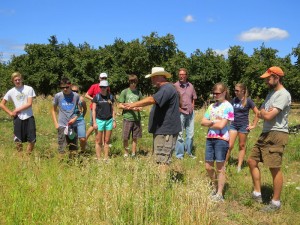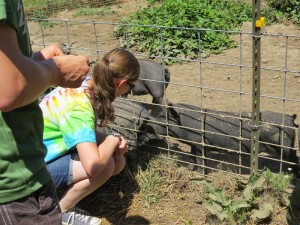Epistemology: the study or a theory of the nature and grounds of knowledge especially with reference to its limits and validity
Humility: a modest or low view of one’s own importance
 One day of the EcoFaith Youth Camp was spent at the Eloheh Farm in the company of Randy and his family. We spent time hearing the story of how they came to Oregon and got started on their farm here. There were many profound things shared during the conversation we had. A few things really stood out. One was in the mission of the farm. Eloheh is about harmony. Being in harmony with the land they are working is paramount to the mission of the farm. When they first bought the land, Randy went to the local Native American elders to find out how they could best honor the land they wanted to use. The answer was simple: to plant huckleberries. Huckleberries once were prevalent in the local land and planting some would honor that history. I think it is very important to remember what we have gotten from the land and how it continues to serve us, even as in many cases, we work toward its destruction. Simple acts like this are a reminder of the rich history and how it is important to remember it and honor it always.
One day of the EcoFaith Youth Camp was spent at the Eloheh Farm in the company of Randy and his family. We spent time hearing the story of how they came to Oregon and got started on their farm here. There were many profound things shared during the conversation we had. A few things really stood out. One was in the mission of the farm. Eloheh is about harmony. Being in harmony with the land they are working is paramount to the mission of the farm. When they first bought the land, Randy went to the local Native American elders to find out how they could best honor the land they wanted to use. The answer was simple: to plant huckleberries. Huckleberries once were prevalent in the local land and planting some would honor that history. I think it is very important to remember what we have gotten from the land and how it continues to serve us, even as in many cases, we work toward its destruction. Simple acts like this are a reminder of the rich history and how it is important to remember it and honor it always.
 The second idea that really stood out was a phrase Randy used: epistemological humility. This is the idea of understanding that you don’t know everything and how you would go about learning something is not the only way it can be done. I think this is a very important phrase to keep close to the heart. I know that there have been many times in my life where I have gotten stuck in the idea of, “That’s not how I would have done it.†Sometimes that idea even sticks around after the task has been done successfully because I often think that my way would have been more efficient or effective compared to what was done. It is sometimes a hard lesson to learn that you aren’t the smartest person around.
The second idea that really stood out was a phrase Randy used: epistemological humility. This is the idea of understanding that you don’t know everything and how you would go about learning something is not the only way it can be done. I think this is a very important phrase to keep close to the heart. I know that there have been many times in my life where I have gotten stuck in the idea of, “That’s not how I would have done it.†Sometimes that idea even sticks around after the task has been done successfully because I often think that my way would have been more efficient or effective compared to what was done. It is sometimes a hard lesson to learn that you aren’t the smartest person around.
There are many ways to approach a problem or task and just because you had one idea about it doesn’t mean that it’s the best. Listening to Randy speak was a revelation. He is a college professor and he speaks about learning from everyone around him. His job is to teach, but even with that he understands that just because he has one approach, it doesn’t mean that others are less valid. I think that is the mark of a true teacher. It definitely reminds me of one of the phrases that was used constantly as I went through my student teaching program. My professors would always say that the goal was to be and to develop “Lifelong Learners.†It wasn’t about teaching kids something, but helping to spark in them the desire to know more themselves.
Learning doesn’t stop when you are done with school. I am constantly learning new things whether it’s from a class I’m taking or from the kids I coach. Sometimes I am left scratching my head when I see how the kids I coach approach a problem. The way they attempt to understand doesn’t make logical sense to me in many cases. To them it does though. Understanding that what works for me doesn’t necessarily work for others and that I have to be adaptable will make me a better coach and help the kids I am coaching learn those lessons as well. I will strive to remember epistemological humility and to take to heart its lessons and live them out.
Read more about Karin and the EcoFaith Recovery Internship program here.
________________________________________________________
To sign up to receive these blog post directly to your email account, click here or on the link in the upper right sidebar of any page at ecofaithrecovery.org.
Please feel free to share this post with others and use the “comment†field below to post your thoughts on this topic. Thanks!
